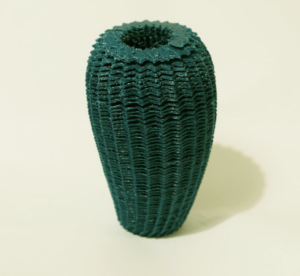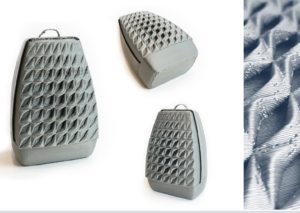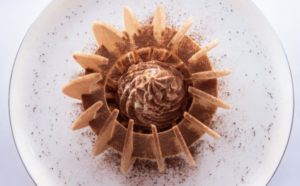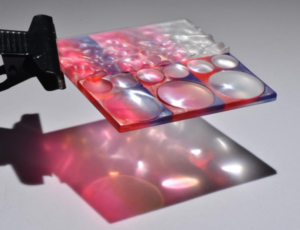206284- Digital Design and Craft
 In this class we will learn the fundamentals of programming both in Processing environment and in Rhino/grasshopper, using a visual and tangible approach that was developed especially for designers. We will produce our designs using digital fabrication tools such as laser cutters and 3D printers. Additionally, paper presentations by students will cover recent Computational Fabrication research from prominent conferences and journals.
In this class we will learn the fundamentals of programming both in Processing environment and in Rhino/grasshopper, using a visual and tangible approach that was developed especially for designers. We will produce our designs using digital fabrication tools such as laser cutters and 3D printers. Additionally, paper presentations by students will cover recent Computational Fabrication research from prominent conferences and journals.
The class is intended for designers with little to no knowledge in coding or in Rhino/Grasshopper, and are interested in expanding their creative skills and capabilities by acquiring knowledge of digital and computational tools.
(Photo: 3D printed Slinky by Marva Tuval , Winter 18′)
206836– Industrial Design in the Era of the 4th Industrial Revolution
 In recent years we witness a boost in the development of additive and digital manufacturing technologies, such as 3D printers, CNC milling machines, digital knitting machines, and more. Those machines are becoming cheaper, faster, and more acceptable for designers, and enable customize the design and new design possibilities. This challenges the traditional role of the industrial designer and raises questions regarding the role of designers in the future. How can we design customized products at scale? How to link information with parametric design? How to design for digital fabrication?
In recent years we witness a boost in the development of additive and digital manufacturing technologies, such as 3D printers, CNC milling machines, digital knitting machines, and more. Those machines are becoming cheaper, faster, and more acceptable for designers, and enable customize the design and new design possibilities. This challenges the traditional role of the industrial designer and raises questions regarding the role of designers in the future. How can we design customized products at scale? How to link information with parametric design? How to design for digital fabrication?
In the course, we will address those questions and others, by practical exercises of designing customized products that will then fabricate using digital fabrication tools.
(Photo: Customizable backpack by Artem Verkhovskiy, Winter 20′)
208314- Studio 3
 The purpose of the Studio 3 course is to support the thesis and final projects of MS students in their second year at the program of Industrial Design. The student will report weekly on progress, and receive personal mentoring. Students will define the scope and goals for presentations at the middle and end of the semester. In addition, the course will focus on practicing communication and presentation skills for the project. Students will prepare a short video describing the work and the goals for their projects. Students writing a thesis will submit a written essay as preparation for writing the thesis or an academic paper.
The purpose of the Studio 3 course is to support the thesis and final projects of MS students in their second year at the program of Industrial Design. The student will report weekly on progress, and receive personal mentoring. Students will define the scope and goals for presentations at the middle and end of the semester. In addition, the course will focus on practicing communication and presentation skills for the project. Students will prepare a short video describing the work and the goals for their projects. Students writing a thesis will submit a written essay as preparation for writing the thesis or an academic paper.
(Photo: Mass customization and user experience of pastries by Michal Lev, Winter 20′)
206822 – Matter of perspective
 Matter of Perspective is a joint course of the Faculty of Architecture and Computer Science. It is taught by Yoav Sterman together with Prof. Gershon Elber and Prof. Miri Ben-Chen.
Matter of Perspective is a joint course of the Faculty of Architecture and Computer Science. It is taught by Yoav Sterman together with Prof. Gershon Elber and Prof. Miri Ben-Chen.
During the semester students work on a single project in mixed teams of computer science and architecture (up to 3 students per group). The goal of each team is to creatively apply geometric algorithms and fabricate objects using additive manufacturing and other computational fabrication methods.
In the course students will implement existing algorithms, some written as part of the research of the faculty members teaching the course from computer science, and external parts, related to the creation of variable geometries based on the perspective of the observer. The algorithms will be at different maturity and challenging levels. Students will have the option to select a project from a list that will be presented at the first lesson of the class. The algorithms will be embedded within the Rhino/Grasshopper environment as an integrated code, which will define a parametric workflow and interface within the Rhino/Grasshopper environment.
Eventually, a large-scale three-dimensional sculpture or object representing geometry will be constructed, and students will tackle the design, construction, and parametric production of the complex parts, emphasizing production technology, materials, production design, structures, and production itself in digital means of fabrication.
(Photo: 3D printed prototype, by Artem Verkhovskiy, Lior Hudesman, Aviv Shitrit, Spring 21′)

